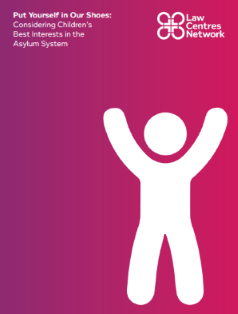Report investigates both the circumstances and experiences of asylum-seeking children across England and Scotland
The Law Centres Network last week published a comprehensive report on the best interests of children in the asylum system.
The report, Put Yourself in Our Shoes: Considering Children's Best Interests in the Asylum System, was authored by Garden Court Chambers' Kathryn Cronin, Baljeet Sandhu (solicitor and manager of the Migrant and Refugee Children's Legal Unit at Islington Law Centre), and Professor Ravi Kohli, child welfare expert from the University of Bedfordshire.
 You can read the full 196-page report here and a 3-page summary here.
You can read the full 196-page report here and a 3-page summary here.
The report focuses on young asylum applicants represented by Law Centres across the UK, and investigates both the circumstances and experiences of 60 children across England and Scotland and the care and asylum processing systems they underwent.
While the UK government is committed to considering children's best interest in all decisions made about them, the report says this is not reflected in practice throughout the asylum system.
The report found varying levels of understanding of children's rights across all those working with them and on their behalf, and it said that this variable quality means that the asylum process is effectively merely only paying lip service to children's best interests.
Law Centres Network identifies child-centred principles from international practice, and highlights areas of good practice in the UK asylum system. It also makes a number of recommendations in the report on improving the asylum process, as well as improving training and skills for those working with children, to ensure that their best interests are well and truly paramount.
The report's summary makes the following key recommendations for those working with children in the asylum system:
For the Home Office:
• The Home Office and Department for Education must develop reliable and relevant statistical data concerning unaccompanied child asylum applicants, including where they are living, and when and by whom ages are disputed and accepted.
• The Home Office must immediately cease conducting 'visual age assessments' of young people.
• Separated children seeking asylum should be referred to an immigration lawyer as soon as possible after their arrival and/or identification, so they are represented by their assigned lawyer at the time of the screening interview.
• Home Office caseworkers should be trained to be supportive of the role of the Responsible Adult in interviews.
• The Home Office should establish a system of training and accreditation for interpreters working with children within the asylum/immigration system in the UK.
• All unaccompanied and separated children should be appointed an independent guardian.
• All professionals making life changing decisions on children should be provided with best interests' training.
For the Legal Aid Agency:
• The Legal Aid Agency (LAA) must provide clear and accessible guidance on the funding and special measures in children's cases.
• Guidance on legal aid available to children and those representing them should be publicly available in accessible form so that those assisting the child, including local authorities and other advocates, understand the legal aid regime.
• The LAA should set up a system for considering urgent applications for case funding for unaccompanied children.
• An order should be made under section 9(2)(a) of the Legal Aid, Sentencing and Punishment of Offenders Act 2012 to reinstate legal aid for all immigration related legal matters involving separated children.
For HM Courts and Tribunals Service:
• A working party including legal aid lawyers should be set up to work with the Upper Tribunal to develop an appropriate legal representation model or arrangements for these children's cases.
For local authorities:
• Young people must not be placed in adult or bed and breakfast accommodation pending an assessment of their disputed age assessment and need.
• Local authorities should take full account of the immigration processes that a child or young person faces when deciding to move separated children from one placement to another.
For lawyers:
• All legal representatives must attend asylum screening and interviews with their child clients.
• All immigration lawyers representing children should be required to have specialist training, and should be rewarded accordingly.
• Lawyers must proactively work to obtain relevant information from the child and from other professionals involved with him/her about the child's past life, their experiences before, during and after flight, their current hopes and fears, and their mental, emotional and physical health.
Julie Bishop, director of the Law Centres Network, was quoted as saying: "People seeking asylum are fleeing conflict and persecution, and none are more vulnerable than children separated from their families. We hope that government will share our concern at the findings and follow our practical recommendations to truly uphold these children's best interests."